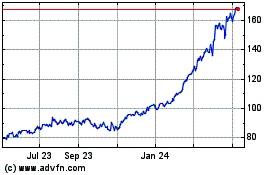In India, a Big GE Deal Goes Off the Rails
September 25 2017 - 7:05PM
Dow Jones News
By Thomas Gryta, Ted Mann and Rajesh Roy
General Electric Co. is in danger of losing one of its largest
industrial contracts after a political shake-up in India,
highlighting the risk of the conglomerate's chase to win business
in far-flung markets by investing heavily in local operations.
GE won a $2.5 billion deal in 2015 to sell diesel locomotives to
Indian Railways -- delivering 1,000 of the machines over 11 years
-- using a structure the company said would be a model for the
future. In exchange for a massive order from one of Asia's biggest
economies, GE would agree to build the locomotives in a remote
corner of the Indian countryside, boosting employment and the local
economy.
But a new railways minister, Piyush Goyal, stunned GE leaders
earlier this month by declaring that India would pull out of the
deal and instead seek to transform its massive rail network to use
electric locomotives exclusively. GE executives met with Mr. Goyal
last week, according to people familiar with the meeting, to keep
the deal together.
"The contract is being reviewed, but has not been terminated as
of yet," a senior official at India's Railways Ministry said. "We
are discussing various options with GE. We are exploring if they
can make electric locomotives for us."
In a nod to the importance of the deal, a GE spokeswoman said
the contract "is being closely followed by the global business
community" and the company is "fully committed to executing this
project."
GE doesn't make electric locomotives.
In his public remarks, Mr. Goyal said the ministry would double
its plans to electrify tracks, from 17,000 kilometers to 35,000
kilometers of track, obviating the need to invest in new diesel
locomotives. It wasn't clear how the country would pay for such a
massive project or supply the needed power, though Mr. Goyal
suggested some could come from solar panels installed along the
railroad right of way.
The still unfinished GE locomotive factory in a tiny village
called Marhaura -- 600 miles from Delhi -- is the linchpin of the
company's Indian investment, and a point of pride to executives
such as former Chief Executive Jeff Immelt, who used the deal as
example of how GE can prosper amid slowing global trade and rising
protectionism.
The complication also comes at a tough time for GE, as new Chief
Executive John Flannery conducts a wide-ranging review of its
portfolio in search of costs cuts and ways to boost growth. GE's
stock is down 21% so far this year, while the S&P 500 index is
up 11%.
India's massive economy is enticing for corporations in search
of growth, but it can prove difficult. Changing political winds and
regional interests can derail progress, leaving steel mills
unbuilt, and buildings sitting empty. Even successful tech
companies such as Facebook Inc. and Amazon.com Inc. face unexpected
challenges.
From the outset, GE officials acknowledged the difficulty of the
Marhaura joint venture. Their confidence resided in part in Prime
Minister Narendra Modi, who has made a point of inviting foreign
investment and emphasized improvements to the country's
infrastructure.
In an interview in April, Banmali Agrawala, GE's head of South
Asia, compared the project to dropping "a very high-tech plant in
the middle of a desert somewhere." But local officials had made the
project development easier, he said, by streamlining red tape and
speeding up approvals.
Most important, Mr. Agrawala said at the time, was "a
consistent, stable policy regime.
"Don't throw surprises at us, because we are talking about
infrastructure here. We're not making chocolates or toothpaste," he
said.
The Railways Ministry now plans to have 95% of locomotives run
on electricity over the next four to five years, according to the
railway official, a big leap from 44% currently. The ministry is
looking into all legal and commercial aspects of the GE contract
and a final decision is expected in about a month, the official
said.
Write to Thomas Gryta at thomas.gryta@wsj.com, Ted Mann at
ted.mann@wsj.com and Rajesh Roy at rajesh.roy@wsj.com
(END) Dow Jones Newswires
September 25, 2017 18:50 ET (22:50 GMT)
Copyright (c) 2017 Dow Jones & Company, Inc.
GE Aerospace (NYSE:GE)
Historical Stock Chart
From Mar 2024 to Apr 2024

GE Aerospace (NYSE:GE)
Historical Stock Chart
From Apr 2023 to Apr 2024
